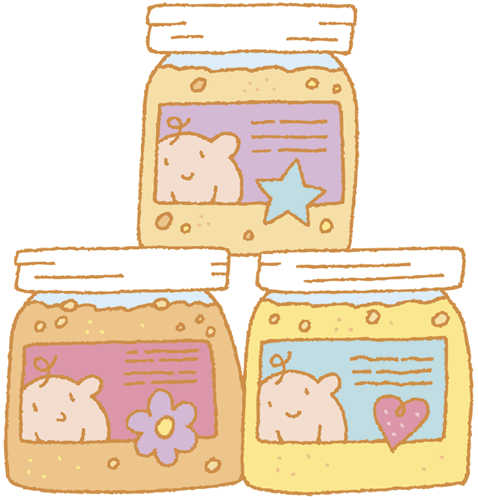|
All of us are busy, and it does make sense to rely on some ready-made purées for your baby from time to time. Balanced by a regular selection of healthy, home-cooked fare, your baby will thrive and learn to appreciate different tastes and consistencies.

| Q: |
Is there anything wrong with using jars occasionally?
| | A: |
There is nothing wrong with relying on the odd jar of food to get
you through a busy period, or when you are traveling and do not have
the means to keep fresh purées cool. The problem is that their
nutritional content may be compromised because of the heat treatment
necessary to make them safe to eat throughout a fairly long shelf life.
These foods tend
to be bland, and lack the natural flavor and aroma of fresh foods, which
can mean, in the long-term, that your baby’s palate is shifted in favor
of less challenging flavors and textures. Giving fresh food from the
beginning tends to make the transition to family food easier.
It’s worth noting that
if you think you don’t have time to prepare homemade baby food, it
doesn’t have to be as time-consuming as you may have thought. See No time to cook?, for quick tips.
|
| Q: |
My baby will only eat food from a jar; what can I do?
| | A: |
Not surprisingly, many babies are reluctant to move back or on to
homemade foods once they have been introduced to the bland,
unchallenging flavors and textures of jarred food.
First of all, you can
simply refuse to buy any more jarred food. Your baby is young enough to
be able to shake a bad habit fairly quickly, and if she realizes that
there is nothing else available, she’ll undoubtedly eat it, after making
a bit of a fuss.
If she’s stubborn, you
can consider mixing some of her favorite jarred food with your own
purées, gradually adding more of your homemade concoctions until she is
accustomed to the taste and the texture. Experiment with different
flavors, and try to come up with combinations that appeal to her. If
she’s very fond of her store-bought apple purée, for example, mix a
little of that into some steamed, puréed carrots. You can also start
introducing your baby to your family meals, by offering her a little on
the side in the form of a finger food. She’ll be more likely to
experiment with something that she can pick up and try herself, and
which looks much like what her siblings or parents are eating.
|
| Q: |
What additives and preservatives should I avoid when I need to use jars?
| | A: |
Most manufacturers are fairly responsible when it comes to
preparing baby foods, and the most damaging food additives do not
usually appear. However, this is not always the case, and if your baby
is venturing off the beaten track to try different foods, there are
quite a few things that it’s advisable to look out for.
The first are sugar and
salt, which are not appropriate for babies, and should be avoided for
as long as possible. There is also some new, convincing evidence that
sodium benzoate, tartrazine, sunset yellow, and some red food colorings
can cause problems, particularly in children who may show some signs of
attention deficit and hyperactivity disorder (ADHD). Obviously you won’t
have a clue whether or not your baby falls into this category, but you
may wish to avoid these additives anyway. They offer no nutritional
goodness whatsoever, and may cause harm. It’s also important to avoid
nitrates, although occasional use is OK.
Finally, avoid
artificial sweeteners as much as possible. These are comprised of
chemicals that may have a detrimental effect on health.
Fresh and natural is your best bet, so avoid anything with a name that resembles something from a chemistry textbook.
|
| Q: |
Should I avoid GM foods?
| | A: |
GM (genetically modified) foods should probably be off the menu.
Although we are still not sure what the long-term effects on health
might be, these foods are very much an unknown quantity, and until
further research is completed, I’d recommend that you avoid them.
|
| Q: |
Do I need to choose organic fruits and vegetables for my baby?
| | A: |
There is no conclusive evidence that organic foods are healthier
than those that are conventionally farmed; however, some studies suggest
that organic produce has higher levels of key vitamins and minerals.
Also, the long-term effects of the pesticides routinely used on
non-organic crops is still unknown, so some people suggest avoiding
pesticides until more is known about these chemicals. The bottom line is
that there is still a lot of conflicting advice and evidence, so it’s
up to you. Many of us find that some organic foods are expensive, so if
you can’t afford them, don’t feel bad. Your baby will be perfectly fine
on a diet of ordinary fruits and vegetables.
|
No time to cook?
Lots of fruits such as
bananas, papayas, and peaches, do not require cooking provided they are
ripe—simply mash them with a fork to make instant baby food. These are
also great when you have no equipment to make purées on vacation . Also, If you get into the habit of cooking for an hour or
so once or twice a week for your baby, and freezing your efforts,
you’ll soon build up a good selection of homemade “jars” to choose from.
|